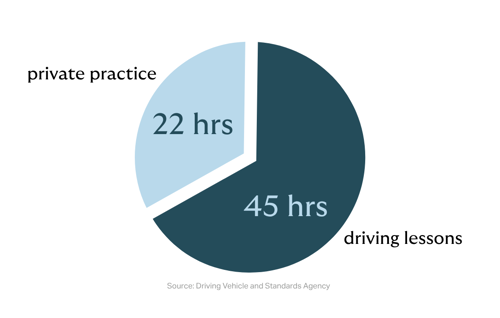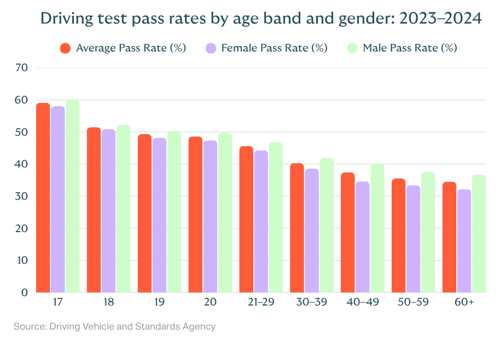08 August 2025
How many driving lessons do you need?
5 minutes
If you’re learning to drive, you'll no doubt be wondering how many driving lessons you need before you're test ready. Lessons are expensive, so it’s natural to want to know how many you’ll need before booking.
While we'd love to give you a straightforward answer, the amount of driving lessons needed really depends on the individual; taking your experience, your instructor, confidence, how often you practice and how quickly you pick things up, all into account.
In this guide we'll dive into what factors affect the number of lessons you'll need, and tips to help you make the most out of your lessons.
What's covered:
- How many driving lessons does the average learner need?
- What affects how many driving lessons you’ll need?
- 5 tips for making the most of your driving lessons
- Driving lessons: FAQs
Are you looking for learner driver insurance? Get in touch with us! A member of the Howden team would love to help you find the perfect policy!
How many driving lessons does the average learner need?
According to the DVSA (Driver and Vehicle Standards Agency)*, the average amount of lessons a learner needs is:
 That’s 67 hours of driving experience before most people are ready to take their practical test.
That’s 67 hours of driving experience before most people are ready to take their practical test.
But this is just a guide — some learners pass with fewer hours, others need more. For example, faster learners may find 20-30 hours of lessons is enough, while slower learners may need up to 60-80 hours before they're test ready.
What affects how many driving lessons you’ll need?
There are several factors that come into play when determining how many lessons you need before your test.
1. Age
Age is an important factor in learning to drive. Data from DVSA on driving test pass rates* demonstrates that younger learners tend to pass faster: 17-year-olds have the highest pass rate at 59.2%, with rates gradually declining with age.

So, the older you are, the more lessons you might want to consider to build your confidence behind the wheel and ensure you're fully prepared.
Male learners also tend to have slightly higher pass rates than female learners, though the gap is narrowing. Older learners may need more time to develop safe driving skills, but consistency goes a long way.
2. Your learning style and pace
People learn at different speeds. You might take to driving like a duck to water, or it might take you a little longer to feel confident and comfortable wheel. Similarly, everyone has a different learning style; some learn best through repetition, while others are visual learners who might benefit from using flashcards and diagrams.
A good instructor will tailor their teaching strategies to the learner, ensuring they've fully absorbed each aspect of driving before moving onto more difficult tasks.
3. Lesson Frequency
How often you take lessons can massively impact how quickly you learn. Learners who drive once or twice a week tend to retain skills better and build momentum, while those who take long gaps between lessons tend to have slower progress.
Longer lessons (e.g. 2 hours per lesson or more ) can also help you cover more ground and get the most out of your money.
Don't get caught out. Sign up for your MOT reminder. Check MOT
4. Your driving instructor
An experienced instructor should help you progress weekly, while teaching new skills, help you avoid bad habits, and build your confidence as a new driver. Their lessons should be tailored to your learning style.
The right instructor could help you reach a test-ready standard in a shorter amount of time. Find out more here: How do I find the right driving instructor?
5. Private practice
Practice makes perfect! If you have access to a private vehicle (e.g. a family member's car) for practice, you can significantly increase your driving experience and may require fewer lessons overall.
The more time you spend behind the wheel, the faster you’ll improve. In fact, research shows that you're 1.5 times more likely to pass when you combine private practice with driving lessons.*
6. Previous driving experience
If you’ve driven before, perhaps in another country or on private land, you may already be familiar with basic controls and road signs. Having a basic foundation can help reduce the number of lessons needed. However, UK driving tests have specific standards, so formal instruction is still essential to meet DVSA requirements.
7. Driving Environment
Where you learn to drive matters. If you’re learning in a busy city with complex junctions and heavy traffic, you may need more lessons to feel confident. In quieter rural areas, learners might progress faster due to simpler road layouts. Your environment shapes the challenges you face, and the time it takes to master them.
5 tips for making the most of your driving lessons
1. Consistency is key!
Taking long gaps between lessons can squash your progress and make you forget techniques and road knowledge. Exams, holidays and work commitments can all get in the way of your progress so make sure you plan your life around your lessons.
Tip: Try to book 2–4 hours of lessons per week. Regular driving helps build muscle memory and keeps your progress on track.
2. Practise between lessons
Private practice helps you apply what you’ve learned, while boosting your confidence and driving experience.
As per DVSA's advice, you should be aiming to do at least 22 hours of private practice outside of professional lessons. Just make sure that:
-
You’re supervised by someone over 21 who’s held a full licence for 3+ years
-
You’re properly insured. Make sure you take out adequate learner driver insurance, and if you're driving someone else's car, such as a parent's, make sure you're a named driver on their policy.
3. Focus on your weak spots
Struggling with parallel parking? Nervous about hill starts? Use your lessons to tackle the tricky stuff. Your instructor should help you identify areas to improve and don’t be afraid to speak up.
4. Know the rules of the road
When you start learning to drive, you should aim to pass your theory test as soon as possible. This way you'll have a much better grasp of UK road rules, which will help you during driving lessons.
It's also worth familiarising yourself with the Highway code, which you can download here.
5. Budget wisely
Driving lessons are expensive business, so you'll want to use your money wisely to maximise your learning time. Generally, you can expect to pay around £25 to £35 per hour, depending on location. To save money:
-
Book lessons in blocks (many instructors offer discounts for block bookings)
-
Ask about student rates
-
Practise privately as much as possible (with the right insurance)
6. Find the right instructor
Choosing the right instructor for you can make a big difference in your learning journey and ultimately passing your driving test. Not sure where to start? Check out our guide here.
Next guide: How much do driving lessons cost in the UK? →
Sources:
*DVSA - Driving test and theory test data: cars
*GOV.UK - How driving instructors can use and support the campaign
Driving lessons FAQs
Is 20 driving lessons enough to pass?
It depends. It’s not just the number of lessons that matters, but their quality and duration. With 20 two-hour lessons and a skilled instructor, you could reach the recommended 40 hours of practice — enough for many learners to feel test-ready. But most learners need more time to feel fully confident.
Is there a minimum number of lessons legally required to take the driving test?
There’s no legal minimum number of lessons required to take the driving test in the UK. You can book your test whenever you and your instructor feel you're ready. If you're eager to pass quickly, you could also consider an intensive course.
How do I know if I’m ready for my driving test?
If you’ve already passed your theory test, your instructor will let you know when they think you’re ready for the practical. As your confidence grows, you’ll likely feel ready too.
Once you and your instructor agree you're ready, they'll usually run a mock test a few weeks before the real one to help you prepare.
Can I take my test without lessons?
Technically, yes. But it’s risky. A qualified instructor can help you avoid bad habits and prepare you for the test format — which could make all the difference on the day.
What if I fail my test?
Don’t worry if you fail! Depending on your age, anywhere from 45% to 70% of your peers will fail the first time, so you won’t be alone. Stay positive, rebook your test, and work with your instructor to improve the areas that need attention.
What if I’m unhappy with my instructor?
Don't be afraid to change instructor if you don't feel they're the right match. You can also file a complaint through GOV.UK if you find your instructor to be unprofessional, unreliable, or inappropriate.
How many driving lessons do you need in an automatic car?
Learners typically need around 17 to 30 hours of driving lessons in an automatic car, which is often fewer than for driving manual, but the exact number depends on your confidence, experience, and how quickly you learn.
More resources
Latest young driver guides
From first gear to full licence: explore our latest guides for young drivers
- Your provisional driving licence
- How do I find the right driving instructor? Our top 10 tips
- How many driving lessons do you need?
- How much do driving lessons cost in the UK?
- The 10 cheapest cars to insure for learner drivers in 2025
- Private practice: everything you need to know
- Manual vs automatic cars: which is best for learner drivers?
- Learner driver insurance: a complete guide
- Driving lesson anxiety: 10 tips for nervous drivers
